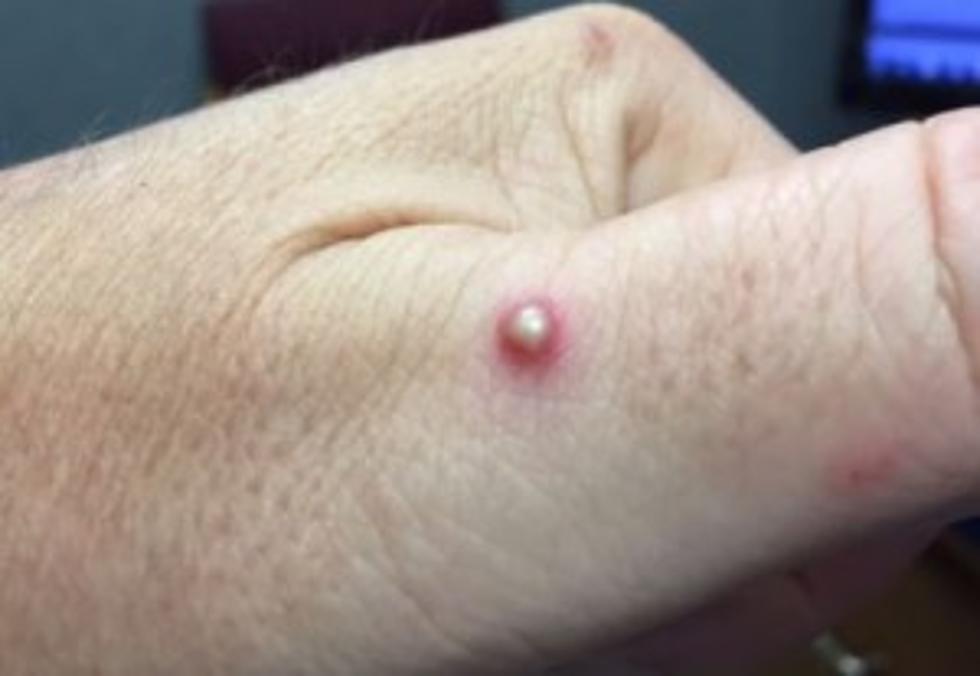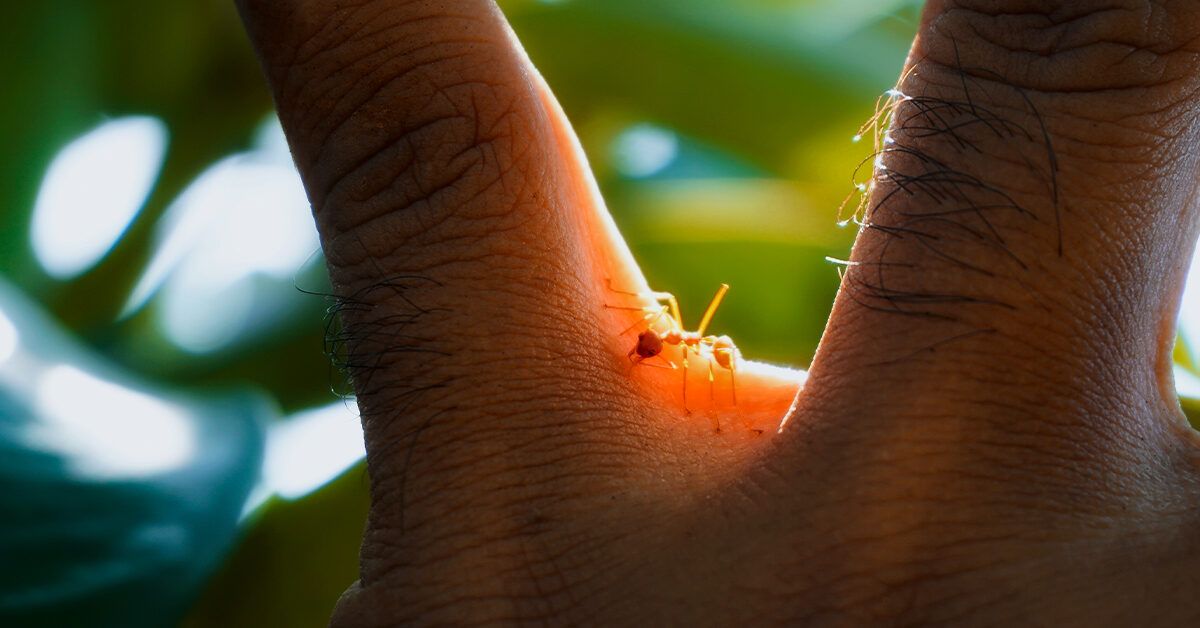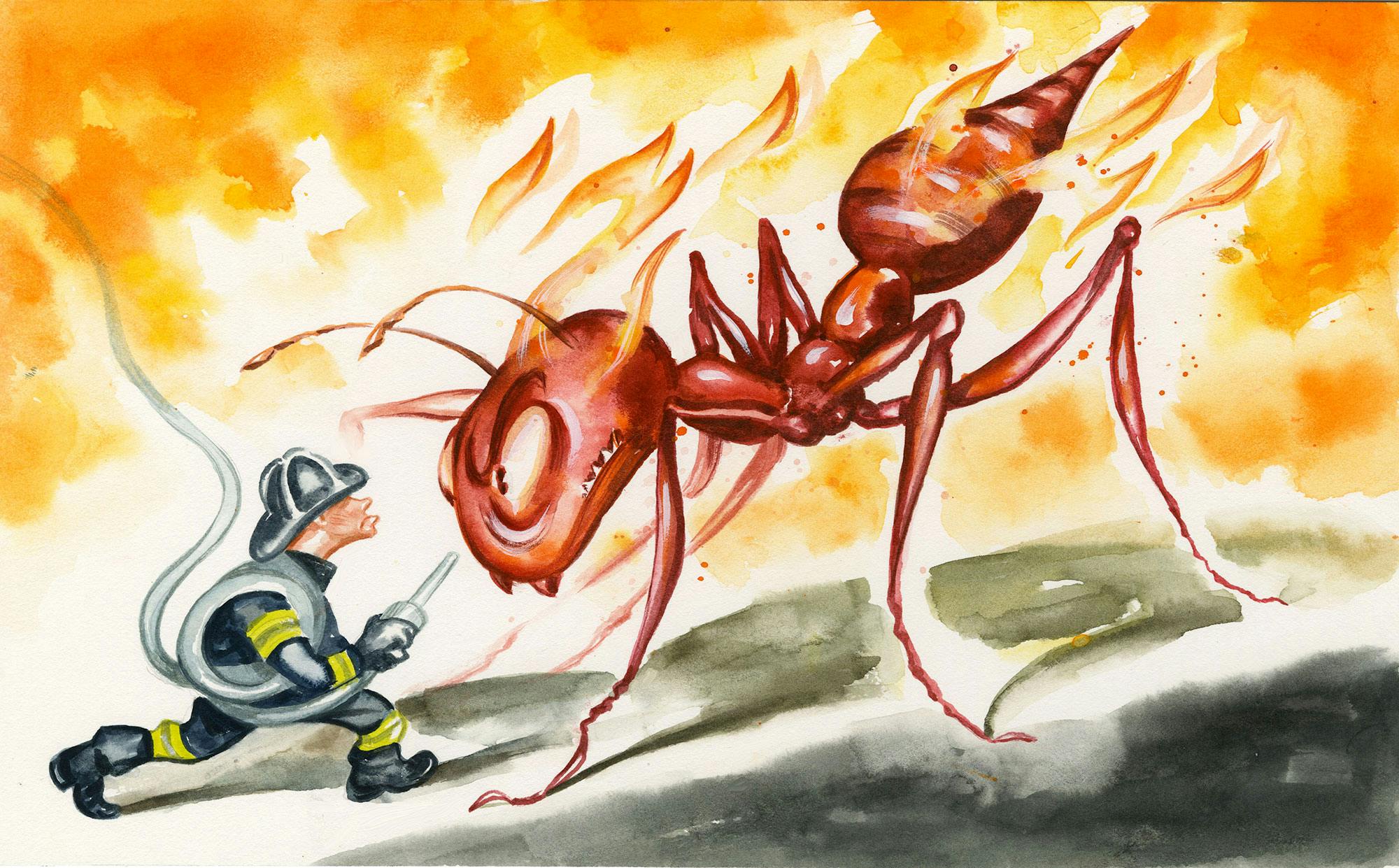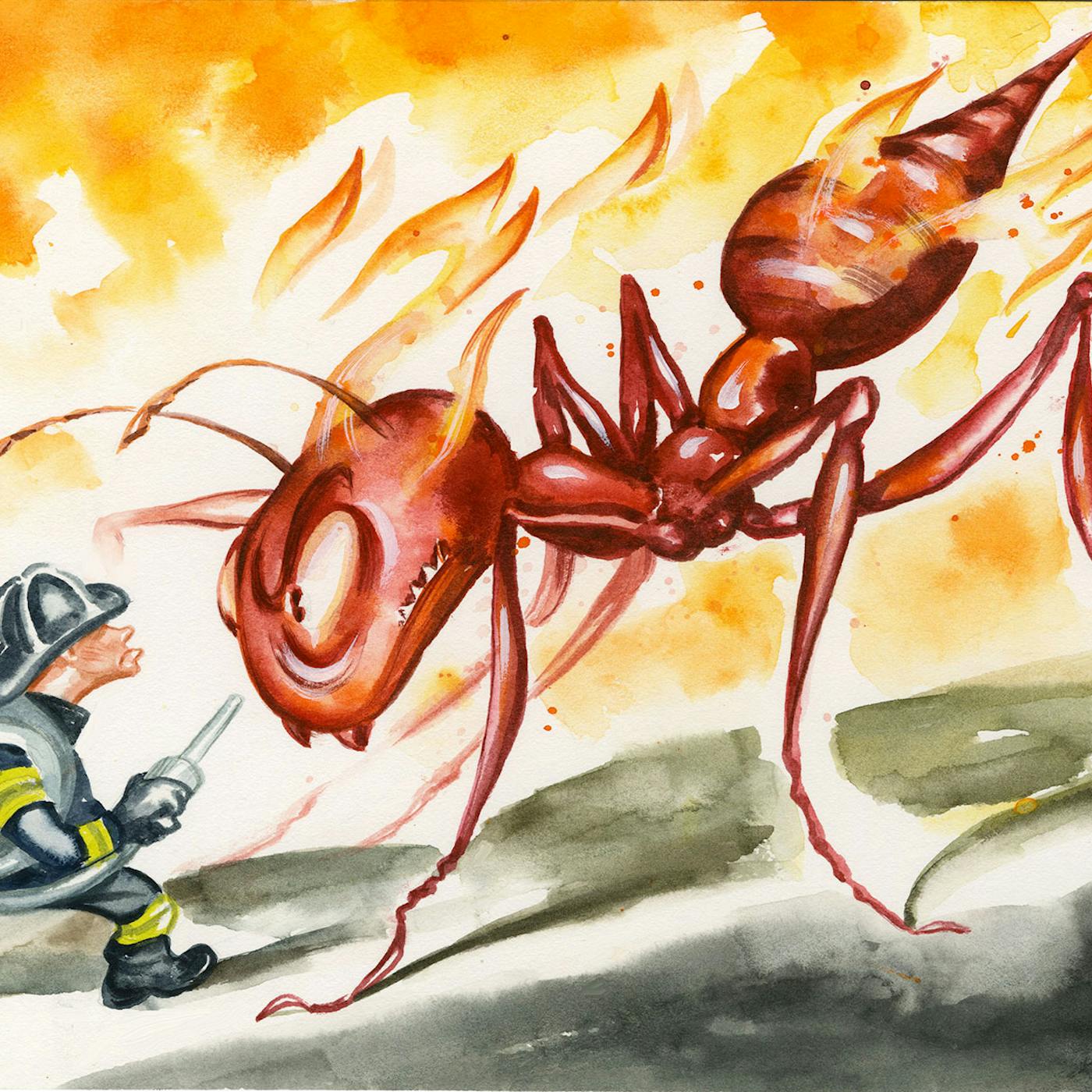No, you are not supposed to pop fire ant bites. Popping them can lead to infection and slow the healing process.
Dealing with fire ant bites can be a painful experience, and the impulse to pop the small, pus-filled blisters is common. Nevertheless, popping these blisters breaks the skin barrier, opening a gateway for bacteria which can exacerbate the issue. Fire ants inject venom, which causes the skin’s allergic reaction, leading to pustules and itching.
Instead of popping, appropriate care includes cleaning the bite area, using cold compresses to reduce swelling, applying antihistamines or topical corticosteroids to alleviate itching, and keeping the area covered to prevent infection. It’s important to monitor for signs of a more severe allergic reaction, such as shortness of breath or swelling, and to seek medical attention as needed. Taking these steps not only accelerates healing but also maintains skin integrity, preventing scarring.

Credit: 973thedawg.com
Myths And Facts About Fire Ant Stings
Welcome to the enlightening world of Myths and Facts About Fire Ant Stings. For many of us, the piercing pain of a fire ant bite is an unwelcome surprise. It often triggers the age-old question: To pop or not to pop? Let’s debunk some common myths and validate what science tells us about these fiery pests.
Common Misconceptions
Living with fire ants means getting used to some tall tales. Folks often say you should pop the pustule that forms after a sting to relieve pain and speed up healing. Some believe that popping prevents infection. Others swear by home remedies they claim will neutralize the venom.
- Should pop for quick relief – a widespread myth.
- Removes venom – people think this reduces toxins.
- Prevents infection – an incorrect assumption.
- Many home remedies work – not all are effective.
What Science Says
Medical professionals and scientific studies provide clear guidance on fire ant sting treatment. Do not pop fire ant bites. Popping can cause infection. It can also leave scars. Fire ant venom contains toxins that cause pain and swelling.
| Action | Effect |
|---|---|
| Popping the bite | Risks infection and scarring |
| Leaving it alone | Reduces risk of complications |
Instead, clean the area with soap and water. Use cold compresses to reduce swelling. Over-the-counter creams may help too. If the pain or swelling gets worse, seek medical help promptly. Always remember: Fire ant stings need proper care to avoid further trouble.

Credit: www.healthline.com
The Anatomy Of A Fire Ant Bite
Welcome to a closer look at the anatomy of a fire ant bite. Understanding the mechanics of how these tiny creatures deliver their painful sting can help you better deal with an encounter. Knowing what happens to your skin can also guide you on whether or not to pop those notorious bites.
How Fire Ants Attack
Fire ants are aggressive when disturbed. They latch onto the skin with their mandibles and inject venom through their stinger. This defense mechanism protects their colonies and ensures their survival.
Physical Effects On The Skin
The sting of a fire ant releases a venom called solenopsin. This causes a range of reactions, from redness and swelling to the formation of painful, itchy blisters. Avoid popping these blisters to reduce the risk of infection.
| Immediate Reaction | Aftermath |
|---|---|
| Sharp pain | Pus-filled blisters |
| Redness and swelling | Itchiness and discomfort |
- Sharp pain at the bite site
- Red, swollen skin
- Formation of a pustule
- Do not scratch the bite.
- Clean the area with soap and water.
- Apply a cold compress to reduce swelling.
Immediate Responses To Fire Ant Bites
The discomfort following a fire ant bite calls for swift action. Understanding what to do immediately after can ease pain and prevent complications.
First-aid Measures
- Wash the area with soap and water to remove any venom left on the skin.
- Apply a cold compress or ice pack wrapped in a cloth to reduce swelling and soothe discomfort. Do this for 10 minutes on, then 10 minutes off.
- Elevate the bitten limb to minimize inflammation.
- Use an antihistamine cream or lotion to alleviate itching and swelling; avoid scratching the bites.
- Consider an over-the-counter pain reliever like ibuprofen if discomfort persists.
What To Avoid Doing
Popularity does not mean practicality, especially when it comes to popping fire ant bites. Do not pop or puncture the pustules that may form. Busting these blisters can lead to infection and scarring. Keep your hands off, no matter how much they itch.
Steer clear from home remedies and folklore treatments without scientific backing. Lemon juice, butter, or oil could aggravate the bites.
Avoid covering the bites with tight bandages that can trap heat and moisture, providing an ideal environment for infection.
Medical Perspective On Popping Bites
Welcome to an insightful look at the medical perspective on popping fire ant bites. Should you give in to the temptation or resist the urge?
Dermatological Advice
Medical experts caution against popping fire ant bites. These bites are small, itchy, and often appear as a raised welt. Dermatologists argue that opening the wound to bacteria from your hands or environment could lead to infection. Instead, they recommend soothing remedies to relieve the itch and swelling.
- Use cold compresses to minimize swelling.
- Apply over-the-counter hydrocortisone cream for itch relief.
- Avoid tight clothing around the bite area to reduce irritation.
Risks Of Infection And Scarring
Popping fire ant bites increases risks significantly. Breaking the skin can introduce germs that might lead to infections such as impetigo, cellulitis, or even abscesses. Infections often require antibiotics and may leave permanent scars.
| Action | Risk | Outcome |
| Pop the bite | High | Infection and scarring |
| Leave it alone | Low | Natural healing, minimal scarring |
Prevent infection:
- Wash the bite area with soap and water.
- Use an antiseptic wipe or cream.
- Keep an eye on the bite for signs of increased redness, warmth, swelling, or pus.
If the bite area appears to worsen or you notice any symptoms of infection, contact a healthcare professional immediately. Treating bite complications early is key to preventing further issues.
Long-term Care And Scar Prevention
Welcome to the crucial stage of dealing with fire ant bites: Long-Term Care and Scar Prevention. The initial bite may be gone, but proper care is key to prevent scarring and ensure healing. Let’s dive into how you can treat the area post-bite and minimize long-term damage.
Treating The Area Post-bite
First things first, clean the bite with soap and water. This removes any bacteria that could cause infection. Next, apply a cold compress to reduce swelling and itching. Keep the area elevated if possible, to further decrease inflammation. Topical creams, such as hydrocortisone or calamine lotion, can soothe the skin. Avoid scratching the bites to prevent breaking the skin.
Minimizing Long-term Damage
To lower the chance of scars, focus on skin healing. Use moisturizing lotion to keep the skin supple. Once the bite heals, apply a silicone gel sheet or cream. This can reduce scar thickness.
If a scar does develop, sun protection is essential. Cover the area or apply a broad-spectrum sunscreen to minimize darkening. For serious scarring, consult a dermatologist. They may recommend treatments like laser therapy or microdermabrasion.
Remember, quick and attentive care following a fire ant bite is vital for healing and scar prevention.
When To Seek Professional Help
Fire ant bites are no picnic, and while most people manage symptom relief at home, certain situations demand professional help. Recognizing when to seek medical assistance is essential for health and safety. Here’s how to tell if a fire ant bite is more than just a painful nuisance.
Signs Of An Allergic Reaction
An allergic reaction can escalate quickly and requires immediate action. Watch for these key signs:
- Swelling at the bite site or surrounding areas.
- Difficulty breathing or a feeling of tightness in the chest.
- A sudden feeling of dizziness, confusion, or fainting.
- Rashes or hives that spread beyond the bite area.
- Sensation of nausea or vomiting.
If any of these symptoms occur, contact emergency services immediately. Anaphylaxis is a life-threatening condition that can arise from an allergic reaction to bites.
Complications That Require Medical Attention
Most fire ant stings heal without complications. Yet, certain signs suggest a more serious problem:
| Complication | What to Look For | Action to Take |
|---|---|---|
| Infection | Increased redness, warmth, swelling, or pus. | Seek doctor’s advice. Antibiotics might be necessary. |
| Persistent Pain | Pain lasts more than a few days. | Consult with a healthcare professional. |
| Fever | Temperature higher than 100.4°F (38°C). | Visit the nearest clinic or hospital. |
| Swelling | Excessive swelling affecting mobility or spreading far from the bite. | Contact your doctor promptly. |
A professional medical evaluation is necessary if you notice any of these complications. Don’t hesitate to reach out to a healthcare provider to ensure your safety and well-being.

Credit: www.texasmonthly.com
Frequently Asked Questions For Are You Supposed To Pop Fire Ant Bites
Should You Bust A Fire Ant Bite?
No, do not bust a fire ant bite. Popping or squeezing can lead to infection and slow the healing process.
Should I Pop The Whitehead From An Ant Bite?
No, don’t pop a whitehead from an ant bite. Popping can lead to infection and slow the healing process. Keep the area clean and apply antiseptic if needed.
Why Do Fire Ant Bites Get Pus?
Fire ant bites often result in pus due to the body’s immune response. The venom prompts white blood cells to converge at the site, leading to pus as they combat the infection.
What Is The Clear Stuff That Comes Out Of An Ant Bite?
The clear liquid from an ant bite is formic acid, which causes irritation and potential allergic reactions.
Conclusion
Managing fire ant bites effectively requires self-control and proper care. Resist the urge to pop them; instead, cleanse the area and apply antiseptic. For relief, consider over-the-counter treatments. Always prioritize safety and consult a healthcare professional if symptoms escalate. Your well-being is paramount.

I’m MD Tanvir, and I bring years of expertise gained from working closely with pest control companies to the forefront. My journey in the industry has inspired me to launch Bug Battler, a platform aimed at equipping people with the know-how to combat pests autonomously. Through Bug Battler, I aim to empower individuals with practical insights to tackle pest infestations effectively.

